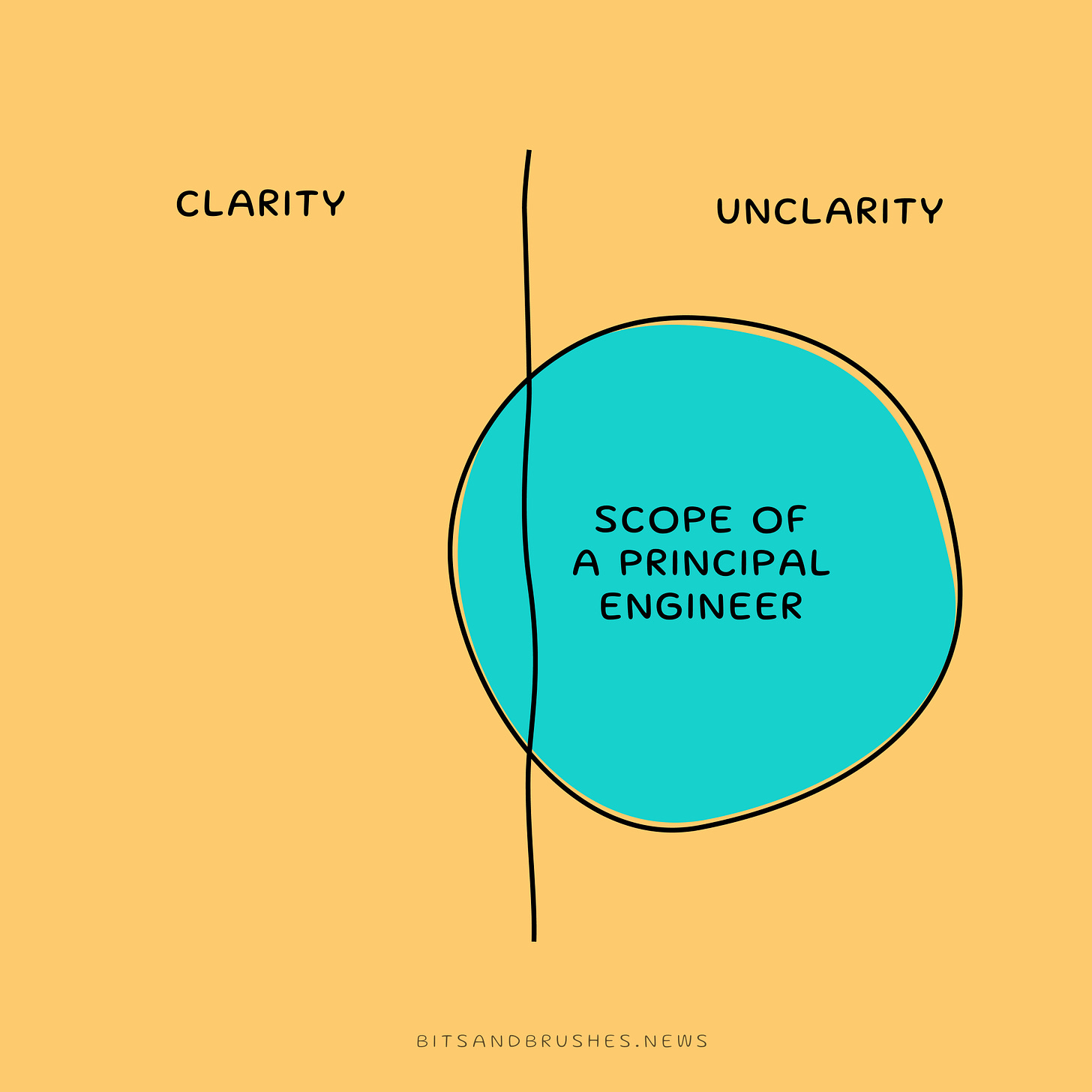Why you won’t be a Principal Engineer
And what are the competencies you must develop to become one 🙂
Engineers usually think of growing at Staff and Principal levels as a natural extension of the engineering path. The truth is, for most companies, it isn’t exactly this way. Even if you are still on the individual contributor path, the scope, responsibilities, and ways to address problems considerably change.
I shared some beliefs and behaviors that might block your promotion in my last text. Now, it is time to understand some neglected skills and misunderstandings.
Together, they might be the main reasons for getting stuck and not being promoted, even if you have excellent performance reviews and work results. Remember, it is not about what you do now. It is about what you can do next.
🤹♀️ You don’t have the technical skills.
👆 You’re a follower, not a leader.
⏰ You don’t make time.
🤑 You don’t prioritize based on value.
🗣️ You don’t adjust your communication accordingly.
🤹♀️ You don’t have the technical skills.
Great engineers don't necessarily become great Staff or Principal engineers. In most companies, the job responsibilities change, requiring different technical skills. At those levels, problem-solving goes beyond just writing code. It involves anticipating issues and addressing complex problems that affect many teams. Often, the problem is not clear.
It's OK to specialize in a particular tech stack. But if you know only one programming language, paradigm, database, etc., you limit yourself. While having a focus is important, having a broader technical vision is also necessary. You can't rely solely on the same skills you need to perform the expectations at your current level.
Familiarize yourself with diverse data storage methods, ecosystem tools, new concepts, and trends. You don't need to know everything but must know what exists and is available as tooling. Diversifying your knowledge will allow you to tackle different challenges smoothly.
Adaptability and quick learning are crucial. You'll need them to check your options and determine your best move.
👆 You’re a follower, not a leader.
You can be proficient and possess the technical knowledge needed to reach the next level. However, this is not the only qualification that will be considered for a promotion.
Being a leader is not about the role but about behavior. Everyone can be a leader. The higher you are, the more others will see you as a role model — a good or bad one. You must have the skills to lead teams, buy people in, and connect them with a purpose.
If you’re good at finding and solving problems yourself, it’s time to start doing it by influencing others. You may also need effective training and mentoring skills to coach other engineers, which is something you develop over time. Look for opportunities in or outside your team (even outside the company you work for) to put it into practice.
⏰ You don’t make time.
Managing your time is your responsibility. Many engineers complain they don’t have time to work on technical topics. The lack of time is often associated with the difficulty of letting things go and delegating some of your responsibilities to others. Sometimes, it means stepping a bit away from the code. If you can’t manage your time at the senior level, you’re missing a crucial skill for upper levels.
🤑 You don’t prioritize based on value.
People won’t tell you what you should do. You must be the one to understand the problems and propose solutions. If you just wait for people to put things on your plate and focus on tasks that don’t bring that value, you won’t go far.
Expectations are usually set at your own level, not the next one. Exceeding expectations means you’re doing a great job in your current position. It doesn’t mean you’re ready for what comes next. If you want to get there, you must focus on value. And understand that it can come from different places. There’s no single answer. You must understand the business and the struggles and act on them.
🗣️ You don’t adjust your communication accordingly.
Different people with different backgrounds communicate in diverse ways. It is important to understand their language and their needs. The cost of not doing it is getting stuck. You must communicate the value your initiative brings to that specific stakeholder. For example, technical improvements are important, but not for all the public. And let’s be honest, you don’t usually need to explain to a technical person the value of a technical initiative.
If you don’t like negotiating or communicating with non-technical people, focus on business value instead of technical value; the next level might not be for you.
You must become an enabler and go far beyond your team’s board and short-term roadmap. Recognize your tone, be aware of it, find your communication style, and improve it. Also, pay attention to how much backstory you will add to your speech. If you don’t, you might lose people before you get your point across.
🔖 Related Content You Might Like
The unspoken skill of finesse and Start right before you get eaten by the bear by Wes Kao. Those texts are amazing. The first provides great insights into improving your message, which, in my opinion, is an important skill in how to buy people in by adapting your communication. The second one will help you focus on the message and avoid losing people with too much unnecessary information.
What I Wish I Knew As a Mid-Level Engineer by Ryan Peterman. It is not only for mid-levels. Everyone should know those things.
3 steps for a FAST promotion to management by Anton Zaides. Even if Anton’s text focuses on the management path, in this text, you will find important things that apply to the technical path, too.
That's all for today! 🎉
I like getting feedback and connecting with people. Feel free to reach out—I'd love to hear from you! You are also welcome to suggest topics for future posts.
See you next time 👋



